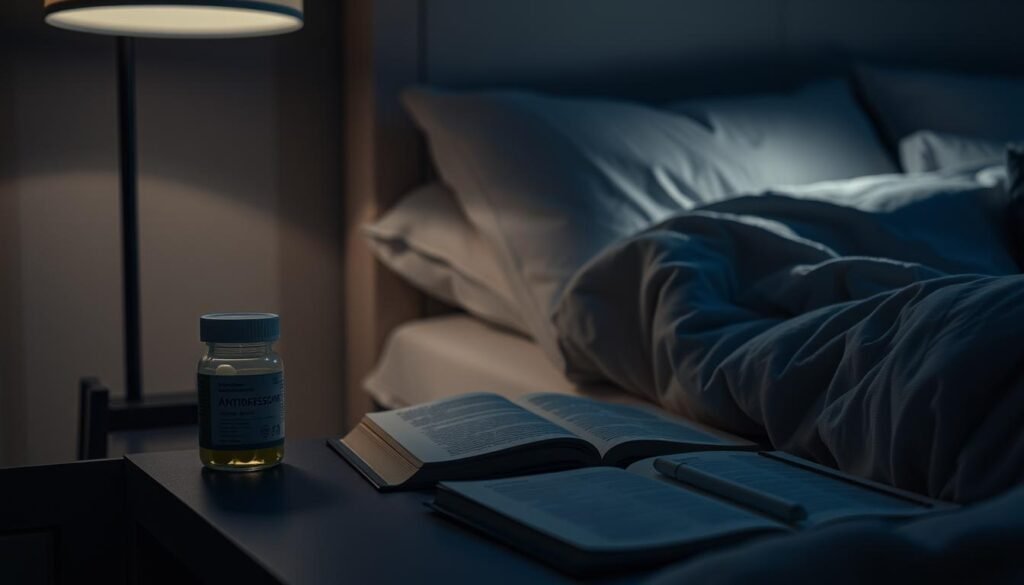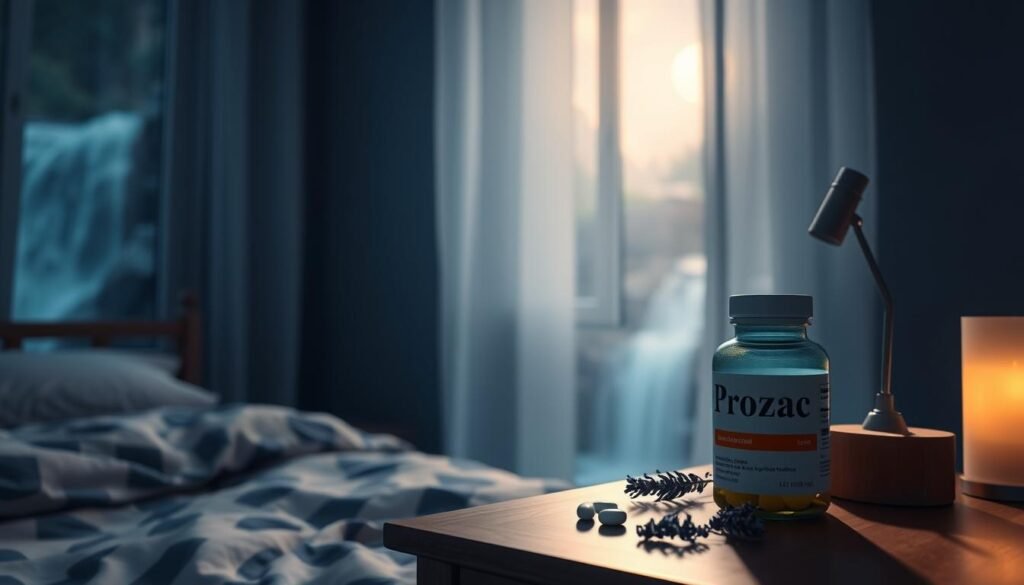Many people with depression find their sleep time hard to pin down. They’re off by at least 30 minutes. This highlights the strong link between mental health and sleep problems. As such, those suffering from insomnia look for various treatments. This includes antidepressants like Prozac (fluoxetine), known for tackling depression and possibly boosting sleep quality. We will explore how fluoxetine might help with sleep issues. We’ll also see how it fits into the wider world of sleep aid medications for depression.
Key Takeaways
- Fluoxetine may alleviate insomnia symptoms for those with depression.
- 78% of depressed patients misjudge their sleep duration.
- SSRIs like Prozac can have dual benefits in mood improvement and sleep aid.
- Understanding the complexities of sleep and mood disorders is essential.
- Antidepressants vary significantly in their impact on sleep quality.
Understanding Insomnia and Its Impact
Insomnia affects millions in the United States. People find it hard to fall asleep, stay asleep, or wake up too early. This leads to big sleeping problems. The insomnia effects harm our mental and physical health a lot.
Those with insomnia often feel more anxious and depressed. Bad sleep makes it hard to think clearly and remember things. This causes confusion and irritability. About one-third of adults say they have insomnia symptoms. This shows how big of a problem it is for public health.
Insomnia does more than make you tired. It can ruin relationships and make work hard. It also means spending more on healthcare. Knowing how insomnia affects us helps find good ways to treat it. We need to fix the root causes of sleep issues to sleep better and feel good again.
| Impact Areas | Insomnia Effects | Percentage Affected |
|---|---|---|
| Mental Health | Anxiety and Depression | Up to 30% |
| Cognitive Function | Memory Impairment | 25% – 60% |
| Work Performance | Decreased Productivity | 40% – 50% |
| Healthcare Costs | Increased Medical Expenses | 70% |
Talking about insomnia seriously can lead to better treatments. It helps people seek help and find peaceful sleep again.
What is Prozac and How Does It Work?
Prozac is a famous medicine known by its brand name for fluoxetine. It belongs to a group of drugs called selective serotonin reuptake inhibitors (SSRIs). These antidepressants work by stopping serotonin from being taken back into the brain. This boosts mood by keeping more serotonin available.
The way fluoxetine works helps make emotions and behavior better by keeping serotonin levels stable. Serotonin is a key brain chemical that affects mood and maybe sleep. Using Prozac mainly helps improve mood. Yet it also plays a role in improving sleep for some.
Taking Prozac can lead to different physical and mental changes. People might feel more energetic, eat more or less, or feel less anxious. But it’s important to understand that Prozac might cause side effects. For example, some might have trouble sleeping, showing it has a complex effect on sleep.

The Role of Antidepressants in Treating Insomnia
Insomnia is a big problem for many, making it hard to sleep well. Antidepressants are often used when someone also feels very sad. Different kinds of depression medication can help with treating insomnia.
In the UK and the USA, doctors like to prescribe SSRIs and SNRIs. Drugs like Fluoxetine (Prozac), Sertraline (Zoloft), and Escitalopram (Lexapro) can improve sleep. They work on depression but can also make sleeping easier as a plus.
SNRIs like Venlafaxine (Effexor) and Duloxetine (Cymbalta) can tackle sleep problems too. Mirtazapine is known for making you sleepy, good for those with mood and sleep issues. Trazodone is another choice, used when other medicines cause side effects.

Antidepressants and insomnia show how complex mood and sleep issues can be. Some studies show a bit of sleep improvement with these drugs. But we need more research to be sure. A recent clinical guide suggests trying these meds for insomnia with depression. Adding cognitive behavioral therapy for insomnia (CBT-I) could make treatment even better.
Choosing the right treatment needs close work with doctors. It’s key to have a plan that tackles sleep and mood problems well. Getting the details on how antidepressants help with sleep is crucial. For more, check out this link on antidepressants and insomnia.
Prozac for Insomnia: Can It Help You Sleep?
Prozac, also known as fluoxetine, is often talked about in sleep disorder discussions. This drug changes serotonin in the brain, affecting mood and sleep. People wonder if it can help with insomnia, mainly when depression and poor sleep come together.
Mechanisms of Action in Sleep Improvement
Prozac may improve sleep in a few ways. It can make some feel more awake or help others fall asleep, helping with sleep regulation. Its effects on reducing the time to reach REM sleep and better sleep quality might help those finding it hard to sleep well.
Clinical Evidence Supporting Its Use
Studies show Prozac could be good for sleep-related problems. In one study, people with depression and insomnia slept better with Prozac. This makes it a potential option for those with sleep issues and mood disorders.
| Study | Participants | Findings |
|---|---|---|
| Fluoxetine and Sleep Quality | Various individuals diagnosed with depression | Significant improvement in sleep quality; reduction in time to fall asleep |
| Prozac in Clinical Trials | Numerous clinical trial participants | Enhanced sleep quality reported post-treatment |
However, Prozac’s effects can vary. It’s important to talk to a doctor due to potential side effects like insomnia or drowsiness. Along with medication, lifestyle changes and therapies like CBT-I can also improve sleep. Learn more about managing sleep issues with antidepressants at this helpful source.

Comparative Analysis: Fluoxetine vs Other Antidepressants
It’s important to know how fluoxetine compares to other antidepressants. Studies show its effects on sleep issues and overall sleep quality. This analysis sheds light on SSRIs and other antidepressants in treating sleep problems.
Effectiveness of SSRIs on Sleep Quality
Research has looked at how SSRIs like fluoxetine affect sleep quality. Other options might work better than fluoxetine. Sertraline, mirtazapine, and venlafaxine, for example, improve sleep more effectively.
Fluoxetine is less effective compared to dothiepin and sertraline in some studies.
Prozac vs Trazodone and Mirtazapine
Fluoxetine’s comparison with trazodone and mirtazapine reveals different results. It’s easier to tolerate than some older antidepressants but not as good for insomnia as mirtazapine. Mirtazapine could improve sleep quality more than trazodone.
Yet, fluoxetine has its advantages in tolerability over some of the newer antidepressants. This matters when choosing a treatment.
Understanding SSRI Side Effects on Sleep
Antidepressants, like fluoxetine, can change sleep quality. Knowing the SSRI side effects insomnia helps in making choices about treatment. While fluoxetine may disrupt fluoxetine sleep patterns at first, sleep might improve as the body gets used to the medicine.
How Fluoxetine May Affect Sleep Patterns
Fluoxetine changes how we sleep, causing SSRI side effects insomnia, like trouble falling asleep or waking up often, at the start of treatment. Studies show 86% of people have at least one side effect within 75 to 105 days of starting SSRIs. Symptoms like feeling very tired or sleepy make it hard to get good sleep early on.
Identifying Potential Long-term Side Effects
Long-term effects of Prozac include various issues. About 55% of patients deal with annoying side effects, and 23% stop taking their medication because of these issues. Problems like sexual difficulties, gaining weight, and ongoing sleep problems are common for those taking SSRIs. Sometimes doctors might not fully see how side effects affect treatment. It’s crucial to keep checking if the treatment is working and manage any side effects. For more information on how antidepressants link to sleep, read this detailed article here.
| Side Effect | Incidence Rate | Notes |
|---|---|---|
| Nausea | Common | Typically begins early after starting treatment. |
| Weight Gain | Variable | May occur with prolonged use of certain SSRIs. |
| Fatigue/Drowsiness | High | More prevalent in early treatment stages. |
| Insomnia | Possible | Some antidepressants exacerbate sleep issues. |
| Dry Mouth | Common | Many antidepressants report this side effect. |
| Constipation | Specific to TCA | Associated with tricyclic antidepressants. |
| Sexual Dysfunction | Common | Includes reduced sex drive and difficulty reaching orgasm. |
Natural Remedies for Insomnia with Prozac
People on Prozac with insomnia might find relief through natural remedies. While Prozac aids in managing depression-related sleep issues, seeking alternative treatments can boost overall sleep quality. These options provide extra support.
Alternative Treatments Alongside Prozac
Adding natural remedies can be helpful. For example, studies show valerian root may improve sleep and treat insomnia. Taking 530 milligrams of valerian extract twice a day for a month has shown good results. Chamomile tea, known for enhancing sleep, is especially beneficial for postnatal women.
Passionflower can help with sleep issues too, reducing anxiety over four weeks. Exploring supplements like melatonin and lavender could be valuable. They have soothing effects and some evidence suggests they improve sleep quality.
Safe Practices for Enhancing Sleep Quality
It’s vital to establish healthy sleep quality practices for tackling insomnia. A regular sleep schedule helps the body recognize when it’s time to rest. Making your sleeping space dark, quiet, and cool also improves sleep.
Trying cognitive behavioral therapy (CBT) is a proven option. CBT has been shown to enhance sleep and deal with depression and anxiety issues.
Adding exercise to your daily life can also help with sleep quality. A study shows regular physical activity significantly boosts sleep and reduces insomnia. Those using Prozac for insomnia might find these natural solutions and changes beneficial for better sleep and overall health.
For more on natural antidepressants and combining lifestyle changes with medication, check out this resource.
Conclusion
The link between mental health and sleep disorders is complex but very important for well-being. The overview of Prozac for sleep issues shows it might help as part of a wider treatment plan. While Prozac can make sleep better for some, it might change sleep patterns, like less REM sleep, which could affect life quality.
Talking to healthcare experts can help find the best solutions for sleep challenges. Since many with mental health issues also have insomnia, treating both can improve results. More studies on how antidepressants affect sleep will help make better treatment choices.
Understanding how insomnia and mental health issues are connected is key. Studies have shown that treating insomnia can boost sleep quality and mental health. By knowing more about sleep and its effects, people can find the right help to improve their health. For more information on mental health and insomnia, check out these extra resources.